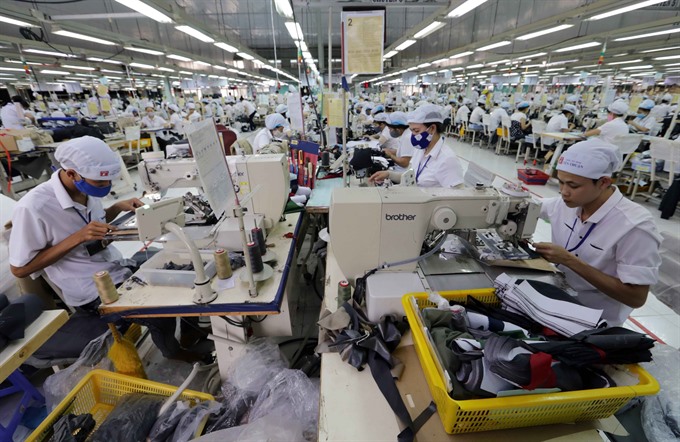 Economy
Economy

Globalisation promotes economic integration and fosters a new wave of bilateral and multilateral free trade agreements (FTAs), creating opportunities and optimism about investment and business towards sustainable development, said Prime Minister Nguyễn Xuân Phúc in Brussels yesterday.
 |
| A production line of Tiến Thuận Garment Company Limited in the southern province of Ninh Thuận’s Phan Rang City. The company’s products are exported to Japan, US and Europe, creating stable jobs for more than 1,800 workers. — VNA/VNS Photo Trần Việt |
HÀ NỘI — Globalisation promotes economic integration and fosters a new wave of bilateral and multilateral free trade agreements (FTAs), creating opportunities for and optimism about investment and business towards sustainable development, said Prime Minister Nguyễn Xuân Phúc in Brussels yesterday.
As the first leader to speak at the 16th Asia-Europe Business Forum (AEBF), Phúc said the era of globalisation and the rapid advancement of science and technology in the 4.0 Industrial Revolution were changing production methods and many aspects of social life, building international links via multilateral frameworks at the regional and global level.
"The world is moving very fast and all of you, who are investors and businesspeople in the competitive environment, feel the heat of these strong changes, with both challenges and new opportunities opening up," said Phúc.
In that picture, Asia and
The PM note that on October 17, the European Commission adopted the EU – Việt
“In the context of increasingly complicated and intertwined challenges, it’s time for us to further strengthen linkages to accelerate the Asia-Europe cooperation and association process effectively, meeting the demands of the business community on two continents, towards sustainable and prosperous development,” said Phúc.
At the forum, which gathered more than 400 leaders from the world leading groups and business community of the two continents, Phúc proposed to organise periodic dialogues among leaders of the countries in Asia and
He said it was necessary to take the initiative in connecting enterprises with enterprises and developing partnerships to implement FTAs between
In addition, businesses needed to actively contribute to personal connections by enhancing corporate responsibility to the social community for job creation, environmental protection and coping with global challenges, for the sake of sustainable development and prosperity.
The PM also shared with the business community the economic outlook of Việt
He said Việt
"We are not only striving to reach the top of ASEAN but also to meet the Organisation for Economic Co-
We are also keen to inspire the startup spirit, especially among young people, with practical incentives to nurture ideas, aiming to reach one million businesses by 2020," said Phúc.
He said that over 30 years of Vietnamese economic renovation and opening up to global integration, European partners had become close friends of Việt
According to Eurocham’s March 2018 survey, 90 per cent of European businesses want to increase their investment in Việt Nam, demonstrating the potential for bilateral cooperation. In order to stimulate this cooperation potential, together with the implementation of the Framework Agreement on Partnership and Comprehensive Partnership (PCA), the early signing and ratification of EVFTA will be a breakthrough, creating a new driving force for the trade and investment linkages between Việt Nam and the EU as well as Europe.
The AEBF brought together business leaders from Asia and
The 16th AEBF is organised by BusinessEurope. As reflected in the title “Connectivity – Building Bridges between Europe and Asia”, the core theme of this year’s AEBF will be the role of businesses in increasing links between Asia and